
Curated by Shai Heredia
Wednesday, October 8, 2014
1 – 4pm
Blackwood Gallery, Kaneff Centre, UTM
Co-presented by the Centre for South Asian Civilizations and SAVAC (South Asian Visual Arts Centre)
Featuring works by:
Shambhavi Kaul (India/USA)
Bee Thiam (Singapore)
Anahita Norouzi (Iran/Canada)
The Youngrrr (Indonesia)
Priya Sen (India)
WALA + Kush (India)
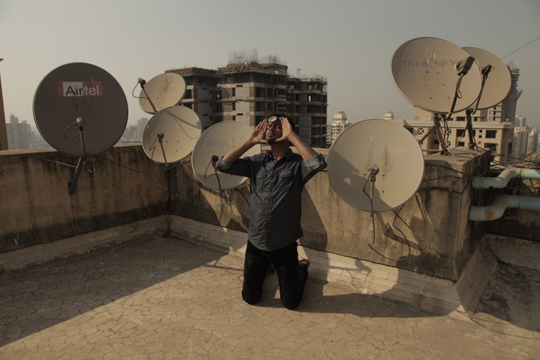
From found footage to performance video, reality television to observational documentary, this set of videos is an investigation into how artists’ moving images perform the political. Join us for a screening and conversation on how cultural agents, with similar socio-political concerns, can create new forms of resistance. Artists include Shambhavi Kaul, Bee Thiam, Anahita Norouzi, The Youngrrr, Priya Sen, and WALA + Kush. For more information, please visit SAVAC’s website.
Monitor 10 is ultimately a celebration of how dramatic narrative within the context of artists’ moving image connects our aesthetic, political and emotional lives, and is derived from radical political, and intellectual positions.
Performing the Political
With the imminent entry of a fascist leader, India is entering one of the country’s darkest and most melodramatic political periods yet. India is often considered the biggest bully in South Asia, and the impact of this election will spill over into the region as a whole. Dictatorships and other threats to democracy are not contexts specific to South Asia, variations of this exact political phenomenon are occurring throughout the world. How can we, as cultural agents, with similar socio-political and aesthetic concerns create new forms of resistance? How can artists’ moving image perform a political role within this crisis of democracy and civil society? Maybe the answer lies in Jean-Luc Godard’s famous proclamation, “It’s not about making political film, but about making films politically”.
When Yvonne Rainer traveled to India in 1971 she was profoundly influenced by the vocabulary of movement, and the use of gesture and dramatic narrative in the Indian dance forms of Kathakali and Bharata Natyam. This was an experience of unique intensity, and a significant moment in the development of her practice. She began to look at whether her “own life contained possibilities of mythology”, and this exploration led to one of her most radical works, Lives of Performers (1972). “Melodrama,” she explains “is the place where behavior and theater meet,” and with this film she investigated the “unalleviated intensity of emotion characteristic of soap opera, where everything is always in crisis or climax.” The theatricality of movement, the issue of emotion in its relation to a politics, and the suggestion of narrativity thus became important features in Rainer’s avant garde cinema.
Through Monitor 10 we engage the politics of drama, with Rainer’s radical artistic practice in mind. From found footage to performance video; reality television to observational documentary, this set of videos is an investigation into how artists’ moving image performs the political.
Smoke creeps through seemingly haunted landscapes. A storm brews, and a parrot squawks from a flowering branch. An atmosphere for melodrama has been set and Shambhavi Kaul’s beautifully unsettling Mount Song begins to unfold. Meticulously constructed with found footage of abandoned sets from Chinese martial arts movies, Mount Song uses the stylistic elements of the science fiction and action genres to problematise cultural representation and the consumption of ‘eastern’ imagery.
Through the drama of Chinese martial arts movies we enter Tan Bee Thiam’s Kopi Julia, a tribute to the Malay horror films of the Cathay & Shaw brothers. Based on a short story by Faizal Sulaiman, Kopi Julia is a mash up of ingredients from silent cinema, television soap opera and German expressionism. The hyper theatricality of the actors with their exaggerated physical expressions, builds towards a climax that is melodramatic, bizarre and outlandishly queer. Kopi Julia offers a radical spin on the genre from which it has been inspired.
While exploring how artists’ moving image challenges genre definitions in multiple ways, Anahita Norouzi’s Tehran, the Apocalypse is another interesting example, as it exists at the intersection of performance and documentary realism. She emphatically refers to the video as a ‘documentation of a performance’ and not a work of video art. Locating herself as a ‘citizen-artist’, Anahita Norouzi performs an act of violence in a public space and creates a moment of extreme tension, as she attempts to challenge gender norms and critique institutionalized forms of political and religious violence in Iran. As the politics of this work is intrinsic to its form, the moment of crisis and the intensity of emotion in the performed violent act, raise critical questions on the role of the artist as both participant and provocateur.
Bringing the performance of politics from a public space into the private space, we encounter Another Colour TV by the Youngrrr, which is framed as both reality television and theatrical drama. The behavior of the ‘actors’ makes a direct comment on the role of television within the everyday dynamics of a family. As the real time situation of viewing is captured, the conflicting value systems of different members of the family become apparent through their response to soap operas, news programmes and commercial entertainment. The mother emerges as the central figure, and the crisis of her lonely domestic reality becomes visible. The melodrama of the everyday unfolds.
This investigation into public-private space is poetically embodied in Priya Sen’s Noon Day Dispensary, a reflection on the dramatic gestures that shape quotidian realities. Filmed at the government run, free dispensary that is open from 8am – 2pm every day in the Savda-Ghevra Resettlement Colony in Delhi, this observational documentary challenges easy narratives around eviction, resettlement and city planning. While highlighting the drama inherent to the struggles of everyday living, Noon Day Dispensary reclaims the style and philosophies of cinema verité, and critiques the context of the developmental activist documentary through its simple, and yet powerful, form.
And finally, We in a one room kitchen field 0.75 by WALA+Kush brings together a cross section of ideas around film form, drama, behaviour, theatre and politics. Intricately layered, this process based collaborative film project has been constructed through interactions, performances, conversations, screenings, shooting, editing and rescreening. Perspectives on development, historical narratives, and issues of waste are discussed on a riverbed of trash, a reclaimed fort and a rooftop of an apartment block. The melodrama of historical narratives and related mythologies unfold through performance poetry, public intervention, musings of the every man and the launch of a new political party.
- Shai Heredia
Shai Heredia is a filmmaker and curator of film art. In 2003, she founded Experimenta, the international festival for experimental cinema in India that has become a significant forum for artists’film and video. She has curated experimental film programs at film festivals and art venues worldwide, including the Berlinale, Germany and the Tate Modern London. She has been a grant maker with the India Foundation for the Arts, and also teaches at Srishti College of Art, Design and Technology. Heredia lives and works in Bangalore.
Shambhavi Kaul| India/USA, 2013 | 9 min
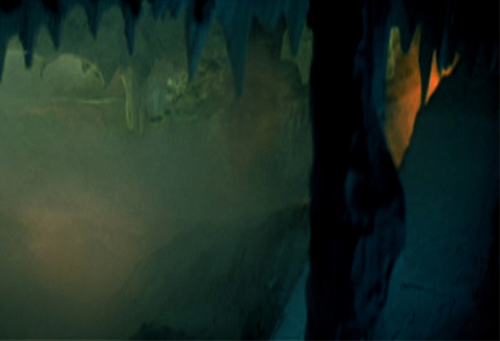
Shambhavi Kaul‘s cinematic constructions conjure uncanny, science-fictive non-places. She has exhibited her work worldwide at venues such as the Berlinale, the Toronto International Film Festival, The New York Film Festival, the International Film Festival Rotterdam, The Edinburgh International Film Festival, Internationale Kurzfilmtage Oberhausen, the Ann Arbor Film Festival and Experimenta India among others. Shambhavi Kaul was born in Jodhpur, India and currently lives in India and the United States.
Bee Thiam | Singapore, 2012 | 7 min

Tan Bee Thiam is a filmmaker, curator and educator. A founding member of the 13 Little Pictures film collective, he directed Kopi Julia, selected by Apichatpong Weerasethakul for the Sharjah Biennale. He also produced the award-winning films, Red Dragonflies and White Days. He founded the Asian Film Archive and is currently the editor of Cinemas of Asia, the NETPAC Journal.
Anahita Norouzi | Iran/Canada, 2012 | 5:13 min
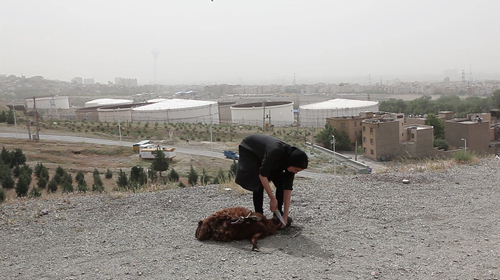
Anahita Norouzi is an Iranian born, Montréal based artist. She graduated from Soureh University/Tehran in 2007 and Concordia University/Montreal in 2013. Norouzi’s practice engages with a variety of media, primarily photography and video. Norouzi has participated in several group exhibitions in Iran and Montreal, including “MOP CAP Art Prize”, Dubai (2013), “Le Festival des Arts de Montreal Nord”, Montreal (2012), “Regards Tehran, Virtual or Real”, Tehran (2010), and the 10th and 11th Biennial of Iran Photography, Tehran (2006 and 2008).
The Youngrrr| Indonesia, 2013 | 8:37 min
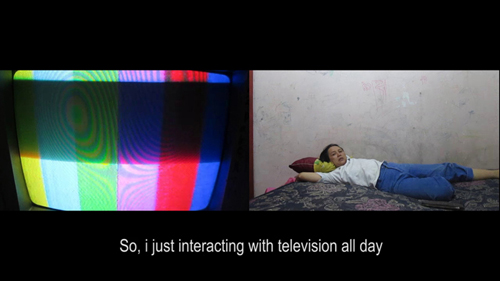
The Youngrrr is a collaboration between Yovista Ahtajida and Dyantini Adeline. They are known as stage videographers and video artists. Their videos have been screened at Microscope Gallery, New York, OK Video 6th International Video Festival, Jakarta, Experimenta, Bangalore & Berlinale, Germany.
Priya Sen | India, 2014 | 26 min
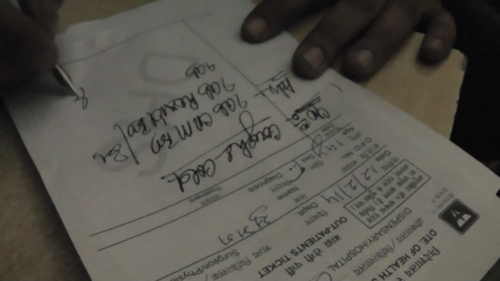
Priya Sen is an artist and filmmaker based in New Delhi. She also works as an editor, sound designer and occasionally teaches experimental film. She works with video as poetry, essay and correspondence, and is interested in constructing video and sound structures and environments. She has worked at Sarai-CSDS in Delhi and the Srishti School of Art Design and Technology in Bangalore. She has been at residencies in Gasworks and Nottingham Contemporary in the UK, and at Khoj Studios in Delhi. Her work has shown at several venues nationally and internationally.
WALA + Kush | India, 2013 | 13:48 min
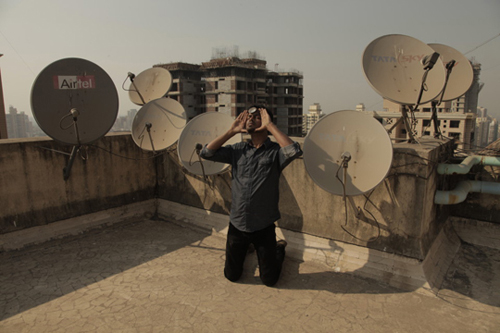
WALA is a Delhi-based collective formed in 2009 by Akansha Rastogi, Sujit Mallik and Paribartana Mohanty. Drawing from people known by their professions such as kabadiwala, ice-creamwala or paaniwala, the deliberately missing prefix of WALA allows inhabiting multiple forms of belonging, associations and affinities. WALA sees itself as producer of situations, encounters, devices, formats that allow dialogues to occur with, or without artists’ presence.
Kush Badhwar is a filmmaker interested in shifting definitions of traditional mass-media, collaborating with unorthodox actors and using artistic intervention for improvised and informal political engagement.